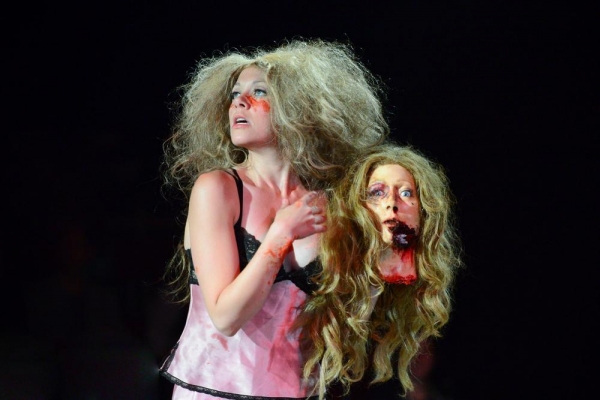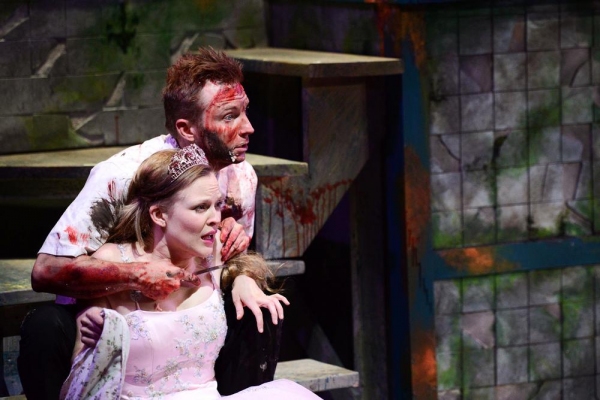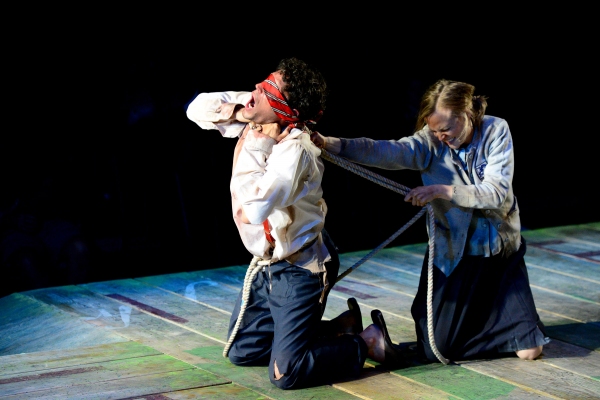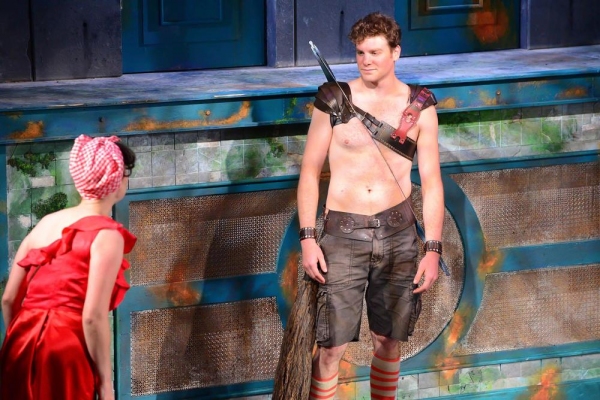Like most stage plays, All Our Tragic concludes with a final appearance by its cast. Just seeing all of those actors again — and thinking back on the multiple roles each of them had played on that stage over the previous 12 hours — was an unusually stirring experience on Sunday night. This was no ordinary curtain call. It felt more like watching runners crossing the finish line at the end of a marathon.
But it was more than that, more than just cheering for a feat of endurance (for the 23 actors and, to a lesser extent, for those of us in the audience). We had also just witnessed a devastating marathon of human folly. Adapted for the Hypocrites theatrical company by director Sean Graney from the plays of Aeschylus, Sophocles and Euripides, this was billed as “32 Surviving Greek Tragedies Performed in One Epic Narrative.”
Over the previous half-day inside the Den Theatre, we’d seen these actors playing characters who committed a seemingly endless string of atrocious deeds — fratricide, matricide, patricide, infanticide, genocide, human sacrifice, incest and betrayal, to name a few — and suffered mightily from the consequences. Seeing those actors gathered all together on the stage in the final moments of All Our Tragic was like coming across the mass grave left behind by all of this horror.

This had not been an unrelentingly grim affair, however. Far from it. It was often irreverent, as Graney and his cast played up the more absurd moments of these ancient Greek stories for laughs. This is a version of the classic tragedies filled with slangy modern dialogue and pop-culture references. All Our Tragic is not a perfect show — it’s hard to imagine any production this sprawling and ambitious, stretching on for nine hours of performance plus seven intermissions, coming off without a flaw. When All Our Tragic does falter, it’s usually when some of the attempts at humor fall flat. But that’s just a bit of nitpicking. Far more often, the daft comedy succeeds, which makes all of the tragedy considerably more bearable.
There’s a tinge of black humor to the most violent moments —the sawing of a foot, the stomping of a baby, the many squirts and spurts of blood. And yet, the silliness rarely undermines the tragic. If anything, it sneakily pulls us into the performance, building our fondness for these characters (and the actors playing them). As the tragedy accumulates, piling higher and higher, we are reminded anew of human existence’s cruelties, but also of its potential for peace, love and understanding — a potential that is often squandered or thwarted, but a potential nevertheless.

You don’t have to sit in the theater for 12 straight hours to experience All Our Tragic. The Hypocrites are selling separate tickets for the four parts of this epic, making it possible to see this cycle of stories spread out over a few days. But seeing it all at once (with breaks for lunch and dinner, plus shorter intermissions) is a remarkable experience. Binge-watch it if you can. Like the best long-form entertainment, it’s richer and deeper because of the time we spend with it. And how often will you ever get the chance to see a 12-hour play? Just think of all the logistical challenges the Hypocrites are going through to schedule this show.
According to a press release for the Hypocrites, the idea is to “create a contemporary Festival of Dionysus, the ancient gatherings for which these tragedies were originally crafted — to bring together a daily community to bond, eat food, drink wine and discuss complicated topics of society that we have been wrestling with since the creation of civilization.”

All Our Tragic is an audacious concept and an astounding achievement. It feels destined to become a signature moment in the history of Chicago’s theater scene. (“Remember that time when the Hypocrites performed all 32 Greek tragedies in one day? Can you believe that really happened?”)
The show’s end is the only time when the entire cast — 17 actors with speaking parts and six others — is on the stage at the same time. Most of the actors play three or four roles, and it won’t be much a plot spoiler to reveal that most of these characters are dead by the time the drama finally draws to an end. When I clapped my hands at the climax, I wasn’t just applauding the Hypocrites’ actors. I was also saluting all of those ghosts I’d come to know.

All Our Tragic continues through Oct. 5 at the Den Theatre, 1329 N. Milwaukee Ave., Chicago. For details, see www.the-hypocrites.com.
